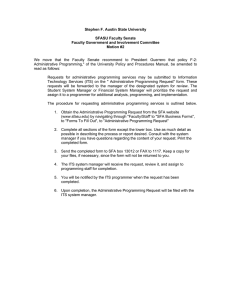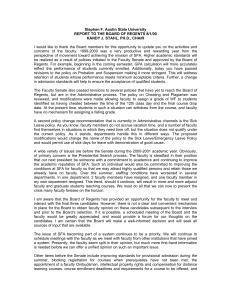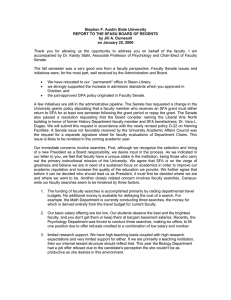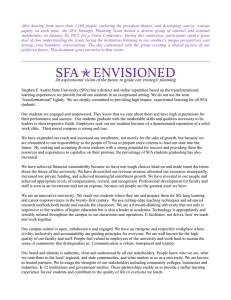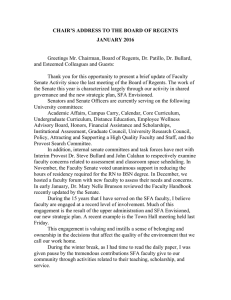Stephen F. Austin State University Faculty Senate Meeting Minutes
advertisement
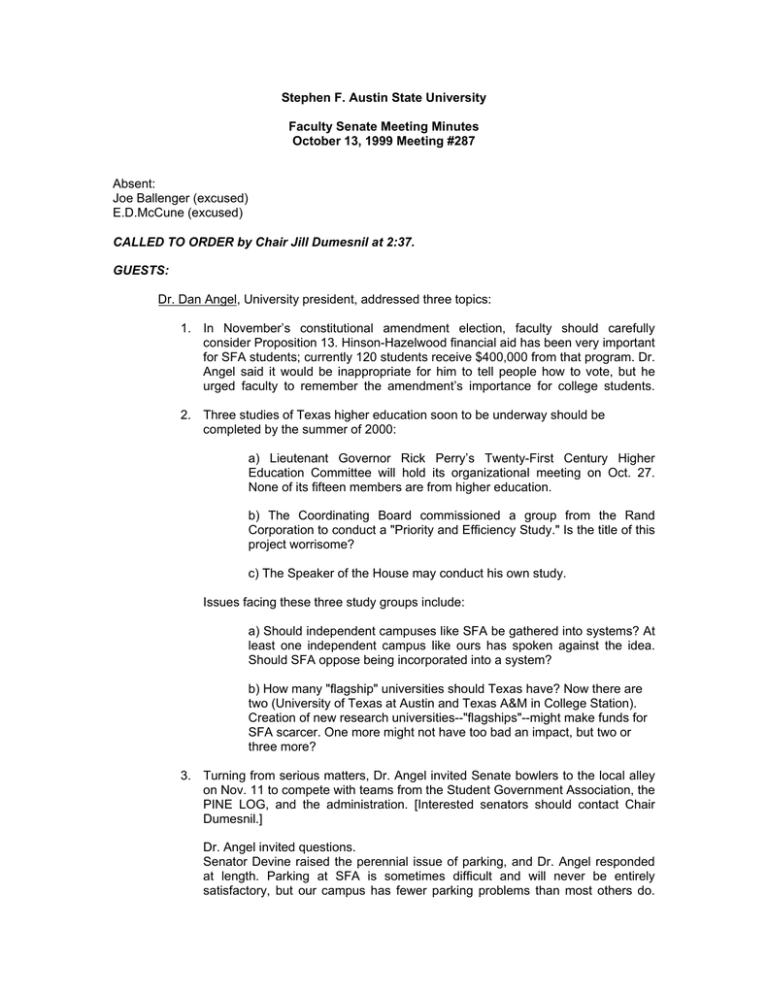
Stephen F. Austin State University Faculty Senate Meeting Minutes October 13, 1999 Meeting #287 Absent: Joe Ballenger (excused) E.D.McCune (excused) CALLED TO ORDER by Chair Jill Dumesnil at 2:37. GUESTS: Dr. Dan Angel, University president, addressed three topics: 1. In November’s constitutional amendment election, faculty should carefully consider Proposition 13. Hinson-Hazelwood financial aid has been very important for SFA students; currently 120 students receive $400,000 from that program. Dr. Angel said it would be inappropriate for him to tell people how to vote, but he urged faculty to remember the amendment’s importance for college students. 2. Three studies of Texas higher education soon to be underway should be completed by the summer of 2000: a) Lieutenant Governor Rick Perry’s Twenty-First Century Higher Education Committee will hold its organizational meeting on Oct. 27. None of its fifteen members are from higher education. b) The Coordinating Board commissioned a group from the Rand Corporation to conduct a "Priority and Efficiency Study." Is the title of this project worrisome? c) The Speaker of the House may conduct his own study. Issues facing these three study groups include: a) Should independent campuses like SFA be gathered into systems? At least one independent campus like ours has spoken against the idea. Should SFA oppose being incorporated into a system? b) How many "flagship" universities should Texas have? Now there are two (University of Texas at Austin and Texas A&M in College Station). Creation of new research universities--"flagships"--might make funds for SFA scarcer. One more might not have too bad an impact, but two or three more? 3. Turning from serious matters, Dr. Angel invited Senate bowlers to the local alley on Nov. 11 to compete with teams from the Student Government Association, the PINE LOG, and the administration. [Interested senators should contact Chair Dumesnil.] Dr. Angel invited questions. Senator Devine raised the perennial issue of parking, and Dr. Angel responded at length. Parking at SFA is sometimes difficult and will never be entirely satisfactory, but our campus has fewer parking problems than most others do. We will never have all students able to park by the front doors of their dormitories nor all faculty able to park just beside their offices, but the administration has been improving parking. SFA recently bought the church property on the southwest corner of Mound and Starr, and even before the church moves to its new facilities SFA hopes to be able to use 60 spaces when the church is not holding services. SFA has bought a Baker St. property with 40 places, and some underused parking spaces will be reallocated. A parking garage seems uneconomic because we would have to charge at least $200 per semester, probably too high a price to attract users. To put things in perspective, our highest enrollment was in 1990. Now we have 1,000 fewer students but 600 more parking spaces. Of course it could be that more students have cars. Senator Mann asked why charge faculty for parking? Dr. Angel said parking permits were necessary to control access, and he thought the $45 faculty fee was a modest charge for the permits and other expenses related to parking. Dr. Mann noted, and Dr. Angel acknowledged, that there were particularly severe problems around the Music Building where parents of children coming for piano lessons and visitors coming for Fine Arts events park in faculty/staff spaces. Dr. Dumesnil asked whether the Board of Regents would approve the Undergraduate Admissions Requirements Committee’s recommendations, which the Senate endorsed unanimously at its September meeting. Dr. Angel did not expect the entire proposal to be approved. The Board is more likely to approve a scholarship package for entering freshmen and transfer students and to postpone approval of the proposed admissions standards until enrollment increases. Dr. Dumesnil expressed disappointment. Dr. Janelle Ashley, Vice-President for Academic Affairs offered to respond to questions Senators might have. Senator Devine said that a department in his college, Liberal Arts, is conducting a chair search, and the dean has appointed himself to the search committee as the outside member. Although that is not prohibited by university policy, some members of the department fear the dean’s presence on the committee may intimidate committee members, especially the untenured, and some believe it bad management for a person to help form decisions he will later review. There are worries whether this would establish a precedent. Dr. Ashley responded that the department in question, the English department, has recently had, as everybody knows, considerable trouble. The situation is unique. Dean Speer believes that he can be a mediator who helps the department choose wisely. His intention was not to give himself a double vote. He had consulted Dr. Ashley beforehand and she fully approved his action. Senator Starr asked about funding search committees: The math department’s travel budget will be sadly depleted because travel expenses of applicants invited for interviews comes out of that budget. Could other funds be found to pay for interviews? Dr. Ashley did not see any other way. Dr. Scharff: Psychology reduces the expense of bringing applicants to campus by requiring an applicant who rejects SFA’s job offer to pay full travel costs; we pay if we reject the applicant or if the applicant accepts our offer. Dr. Starr: When he was interviewing, such an approach would have alienated him, causing him to wonder if applicants were treated that way, how did SFA treat those already here? Senator Sullivan: Does the university calendar for the next two years reduce class days in Summer I? Usually July 4 has been a marker preceding Summer I exams, but on the new calendar Summer I exams come before July 4, not after it. Dr. Ashley said that in compiling the calendar a great effort was made, in response to faculty complaints, to give Fall and Spring the proper number of days. She is not aware that summer was cut--certainly there was no intention to do so. Dr. Stahl returned to the subject of the English department’s chair search committee. If Dean Speer is not a voting member, then there would be an even number of voters on the committee; if a rejected applicant learned that a dean, who later passed on the committee’s work, was a member of the committee, there might be grounds for a law suit from a rejected applicant. Dr. Ashley did not want to comment on that. Dr. Tom Franks, Dean of the College of Education, discussed, in great detail, distributing several printed handouts, SFA’s recent showing in the ExCet tests. There should be no misperceptions: SFA’s teacher education programs are all accredited. SFA has one of ten state programs accredited by the National Council for Accreditation of Teacher Education. However, the legislature has created an accountability system which divides students taking the ExCet tests into groups of male, female, white, African American, Hispanic, and "other" (we did not have any significant number of "other" students taking the tests). The aim is to oblige institutions to give full attention to each group. The required passing rate for each group is 70% for this year or a cumulative 80% for each group which took it in 1998 and 1999; in September 2002 the standards will be 75%for each group or 85% for cumulative scores. In the latest tests, the passing rate for all SFA students together was well above 70% at 92.32%, an overall rate comparing favorably with those of institutions like Trinity University and Austin College which have more selective admission standards than SFA, but one of our groups, African Americans, had failing scores on several ExCet tests, and therefore the State Board of Educator Certification has rated SFA’s teacher education program "Accredited--Under Review." SFA is diligently employing "intervention strategies" to achieve a passing rate for every group. Last year the College of Education introduced reviews, individual tutoring, and practice tests, and one group, Hispanics, which did not pass last year, did pass this year. As a result of this year’s tests, SFA will receive an oversight team, and we hope those outside experts will help us bring everybody to a passing rate. The team, which will visit here November 11 and 12, is headed by Dr. Arthur Hernandez of the University of Texas-San Antonio, and includes an expert from the University of Texas-Tyler and one from the University of Houston. Last year Dr. Hernandez reviewed Texas Southern, and this year Texas Southern achieved passing rates. Dr. Franks is mailing members of the Faculty Senate packets with even fuller details than what he presented in this meeting. The meaning of "cumulative passing rates" puzzled senators. Dr. Franks and Dr. Patsy Hallman, who was also visiting, explained that the cumulative rate comes from combining those in a group who passed a test in either 1998 or 1999. Almost all students take two different ExCet tests; some take three. Dr. Devine asked about raising the GPA requirement for entering the teacher education program above the present 2.5. Dr. Franks said raising the bar had been considered, but the College of Education has not favored doing so because a correlation between GPA and passing ExCet is unproven. Dr. Starr asked about the bar code, which admits students to the ExCet test. He understood that people who have not taken any math at SFA have taken the test here, and their failures counted against SFA. Dr. Hallman said anyone with a degree from elsewhere who had taken professional education courses at SFA could take the test here, but starting in October 1999 we will not be penalized for students who took their subject fields elsewhere. Dr. Franks and other deans across the state lobbied for this revision. Jennifer Sessions and Mary Frances Bradford from the Blood Center, the last guests of the day, described the national crisis in blood supplies and asked the Senate to support a blood drive. For the Blood Center to use University facilities sponsorship by a university organization is required. The Senate agreed unanimously to a blood drive October 26-27 from 9:00a.m to 4:00p.m. in Regents Suite A. (Moved by Dr. Stahl, seconded by Dr. Sementelli.) It was emphasized that the drive is by no means limited to faculty and staff: students and the general community are most welcome! MINUTES of the Sept. 8 meeting were approved. ANNOUNCEMENTS: Chair Dumesnil: Senator Larry King will be Parliamentarian. Chair-elect Stahl: She has reestablished the Senate Web Page. It will include minutes and roster. Get to it from the SFA Home Page via the Faculty/Staff link. OFFICERS’ REPORTS: Chair Dumesnil: The Board of Regents meets this month. On the status of changes to university policies approved by the Senate last year: The Academic Affairs Council in its September meeting assigned the 1998-99 Senate’s Resolution on Anonymous Signatures on Evaluations of Administrators (concerning Policies E10A and E38A) to a committee. For Policy E20A ("Faculty Evaluation, Merit Pay, Promotions, and Tenure Faculty), the Senate last year recommended annual evaluation feed back from chairs to faculty members seeking tenure or promotion; the university policy as revised in October 1998 does not include our recommendation; The Senate’s recommendations for Policy E1A (Academic Appointments and Titles) were approved by the Regents in July; For Policy E48A (Summer Contracts), the Regents in their July 1999 meeting included the Senate’s recommendation that each department have a written policy about how Summer assignments are made. Dr. Stahl: The Academic Affairs Council revised Policy E20A in October 1998, but the Senate’s recommendation came later in the 98-99 academic year. Is that why the Senate’s recommendation was not incorporated in the policy? Dr. Scharff: the recommendation may have been merged with E50. Dr. Ashley: a number of departments do have pre-tenure evaluation systems, but one may question whether it would be presumptuous for just a chair to asked to provide evaluation feedback since all tenured faculty vote on tenure? Do we want to burden all tenured faculty with providing tenure predictions each year to untenured faculty? Continuing her report, Dr. Dumesnil said the Academic Affairs Council approved granting academic credit for "life experiences" in a degree program in the College of Applied Arts & Sciences. Dr. Ashley explained this is standard practice nationwide in such programs. We have been doing it since the 1970’s but a formal policy was in order. Chair-elect Stahl reported on the Graduate Council’s September meeting. Graduate enrollment is down 2.2%, or 33 students. The drop may be partly attributed to our terminating courses taught by adjuncts and the Secondary Education department capping some courses. Graduate stipends are to be raised $200 p/a to $6,200 and there will be five more graduate assistants. Because of budget constraints, these changes are less than the Graduate Council recommended last year. The Council recommended higher stipends and more GAs. A Master of Public Administration degree will be proposed to the Board of Regents this month. Dr. Jeffrey will attend the Senate next month to explain how the University Calendar is made. Treasurer Betty Alford reported a balance of $4,969 in the Senate’s account. COMMITTEE REPORTS Academic Affairs: Chair Brian Oswald: The committee continues its consideration of how in computing GPAs we allow substitution of a higher grade for a lower grade. The committee is comparing our policy with what is done at UT, A&M, Southwest Texas, and Sam Houston. Senators are urged to poll their constituents about what our policy should be. Dr. Tinsley commented that our students do not realize that graduate and professional schools to which they may apply will take into account all courses a student attempts, not just the ones used to calculate the GPA. Administration & Finance: For the committee, Senator Alford moved, and Dr. Tinsley seconded, a resolution favoring increased GA stipends (with a friendly amendment adding the words "a minimum of"): After a survey conducted last fall of nineteen universities in Texas to compare graduate student stipends and after consideration of graduate stipends at Stephen F. Austin State University, the SFA Graduate Council recommended a four year plan to increase graduate stipends to a minimum of $7,500 for nine months by 2003 by annually increasing stipends $375 to reach this goal. In addition the Graduate Council recommended increasing the number of new graduate assistant positions by thirty new graduate student positions by 2003. Be it resolved that the Faculty Senate endorses the Graduate Council recommendation stated above and urges the administration to make the necessary adjustments to reach this goal. Dr. Ashley reminded the Senate that departments sometimes award GAs more than the official stipend because they can combine stipends. Dr. Burt said there may be some inconsistency in policy because recently he was not allowed to specify in a grant proposal a GA stipend higher than standard. Elections: Senator Rebecca Greer, chair, announced three vacancies: 1. In the College of Education: Her committee will seek applicants. 2. In the College of Business because Dr. Wilbur Clark has resigned because of his wife’s illness; 3. In the College of Fine Arts because Marielon Ratliff resigned from the university in May. Two members of that college have volunteered for the vacancy. According to the constitution the Senate should choose between them in a special meeting. Advocating a time saving parliamentary maneuver, Dr. Greer and Dr. Dumesnil suggested that we adjourn our present meeting, hold a special meeting for the election, and then reconvene this meeting. With unanimous consent all this was done, and in the Special Meeting, which will be referred to as Meeting #287A, Dr. Elizabeth Hostetter was elected. The student assistant, Laura Jennings, the secretary, and the Senate chair counted the ballots. Professional Welfare: Senator Tina Oswald: The committee was considering a policy that any faculty receiving a summer research grant from SFA should be obliged to return in the Fall or else refund the grant money. Senator Devine said such a policy would be in the spirit of the Faculty Development policy [E23A]. Senator Sullivan said the policy should specify completion of a semester, not just "return" to SFA. NEW BUSINESS: Dr. Starr: It can be difficult for a small department to get the five students required to "make" a graduate course. Can we go with a smaller number? Chair Dumesnil and others said five is a state requirement SFA cannot change, but Senator Sullivan said deans have sometimes made exceptions. In the discussion that followed it was noted that the Board of Regents strongly disapproves exceptions. Dr. Scharff: The senate could be disseminating information to the faculty body more efficiently. Can we not send information by a general e-mail to all faculty? Chair Dumesnil said she would investigate the feasibility of the senate sending one general e-mail message per month. There was widespread fear of "spam" and we should refrain from sending too much by e-mail. One senator wondered we should worry about "spam" for it only takes a keystroke to delete unwanted e-mail. At this point many senators were tired, and most felt it was time to adjourn. ADJOURNED: 4:45. Respectfully submitted, Joe Devine, Secretary
